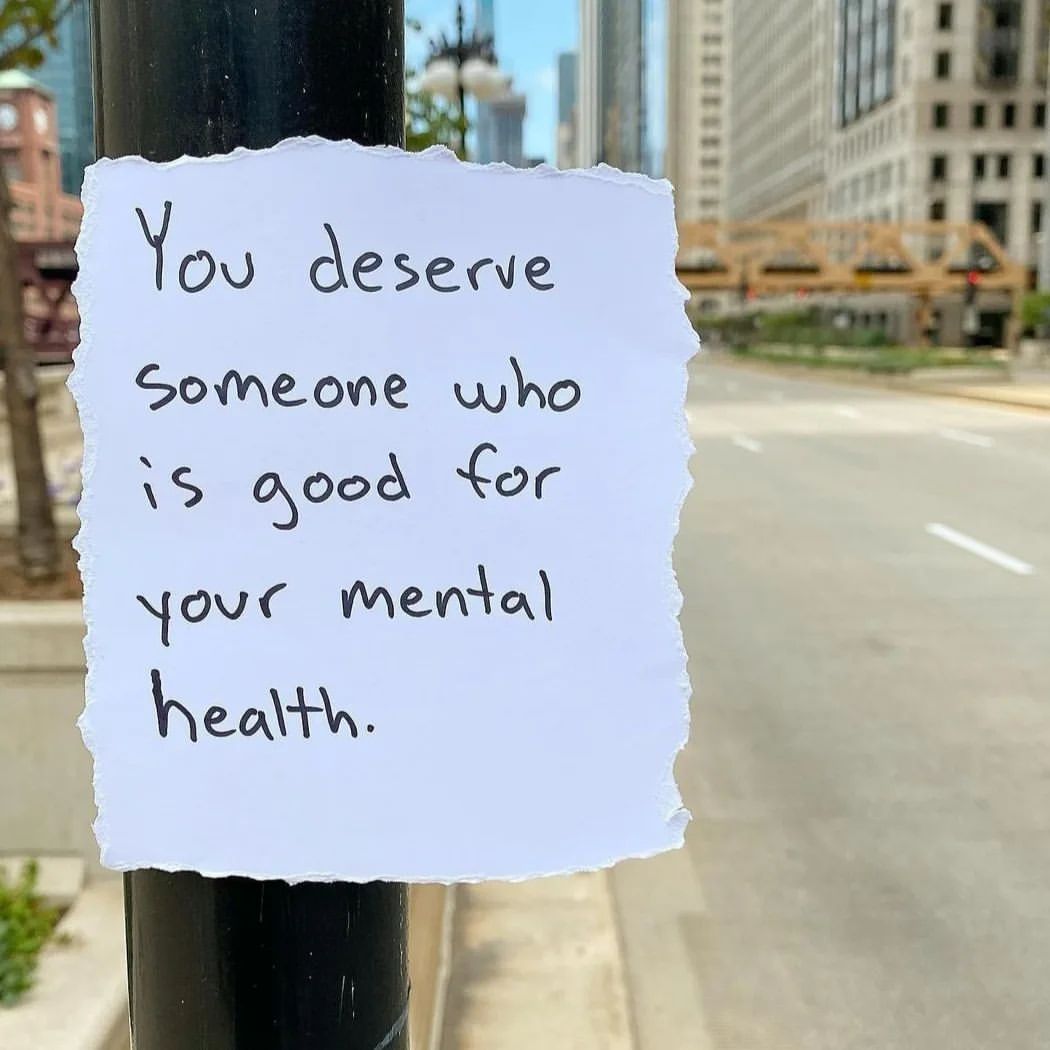You Deserve Someone Who Is Good For Your Mental Health
You deserve someone who is good for your mental health. This isn’t just a feel-good statement; it’s a crucial element of a fulfilling and happy relationship. This guide explores what constitutes a mentally healthy relationship, how to identify your needs and boundaries, and how to find a partner who prioritizes your well-being. We’ll cover everything from recognizing red flags to building strong communication and seeking support when needed, ultimately empowering you to create a relationship that nurtures your mind and spirit.
Understanding the impact a partner has on your mental health is key to building a strong and supportive relationship. We’ll delve into the characteristics of a healthy relationship, exploring how open communication, mutual respect, and shared values contribute to overall well-being. Conversely, we’ll examine unhealthy dynamics, such as manipulation and control, and their detrimental effects on mental health. This understanding will help you make informed decisions about your relationships and prioritize your own well-being.
Defining “Good for Your Mental Health” in a Relationship
A mentally healthy relationship fosters emotional well-being, mutual respect, and personal growth for both partners. It’s characterized by open communication, trust, and a shared understanding of individual needs. A partner’s behavior significantly impacts mental health; supportive actions nurture well-being, while negative actions can lead to stress, anxiety, and depression.
Characteristics of a Mentally Healthy Relationship
Mentally healthy relationships are built on mutual respect, empathy, and open communication. Partners feel comfortable expressing their feelings and needs without fear of judgment or criticism. There’s a balance of independence and togetherness, allowing each individual to maintain their own identity while nurturing the connection as a couple. Trust is paramount, and both partners feel secure and supported in their relationship.
Impact of a Partner’s Behavior on Mental Wellbeing
A partner’s actions directly influence mental well-being. Supportive behaviors, such as active listening, empathy, and offering encouragement, contribute to a positive mental state. Conversely, behaviors like criticism, control, manipulation, or emotional neglect can significantly harm mental health, leading to anxiety, depression, and low self-esteem. For example, constant belittling can erode a person’s confidence, while consistent emotional support can bolster their resilience.
Examples of Actions That Support Mental Health in a Relationship
Supporting a partner’s mental health involves active listening, validating their feelings, and offering practical assistance when needed. This might include helping with chores, providing emotional support during difficult times, or encouraging them to pursue hobbies or activities that bring them joy. Celebrating achievements, both big and small, and engaging in shared activities that promote relaxation and bonding are also vital.
For instance, taking a relaxing bath together, engaging in a shared hobby, or simply having a quiet evening at home can foster a sense of calm and connection.
Identifying Red Flags in Relationships That Harm Mental Health
Red flags include controlling behavior, gaslighting (manipulating someone into questioning their own sanity), constant criticism, emotional unavailability, and a lack of respect for personal boundaries. Isolation from friends and family, threats or intimidation, and verbal abuse are also significant warning signs. For example, if a partner consistently dismisses your feelings or tries to control your actions, these are serious red flags indicating an unhealthy dynamic.
Recognizing Your Needs and Deserving Better
Self-awareness is crucial for establishing healthy relationship boundaries and prioritizing your mental well-being. Understanding your needs, values, and limits allows you to communicate effectively with your partner and set healthy boundaries.
The Importance of Self-Awareness in Relationships
Self-awareness involves understanding your emotions, needs, and boundaries. It helps you recognize when your needs aren’t being met in a relationship and empowers you to communicate those needs effectively. This self-knowledge is essential for setting healthy boundaries and maintaining your mental well-being.
Personal Boundaries and Effective Communication
Personal boundaries define your limits and what you’re willing to tolerate in a relationship. Communicating these boundaries involves clearly and calmly expressing your needs and expectations. For example, if you need space after a stressful day, communicate that need directly to your partner.
Prioritizing Your Mental Health in a Relationship
Prioritizing your mental health involves engaging in self-care activities, setting boundaries, and seeking support when needed. This might include spending time alone, pursuing hobbies, practicing mindfulness, or seeking professional help. It’s essential to remember that your well-being is paramount, and you deserve to be in a relationship that supports it.
Non-Negotiables for a Healthy Relationship
Non-negotiables are the fundamental aspects of a relationship you will not compromise on. These might include mutual respect, trust, honesty, open communication, and emotional support. They represent your core values and what you require for a fulfilling and healthy relationship. Examples could include a partner who respects your independence, actively listens to your concerns, and supports your personal growth.
Identifying Partners Who Prioritize Mental Wellbeing: You Deserve Someone Who Is Good For Your Mental Health

A partner who prioritizes mental wellbeing actively supports their own and their partner’s emotional health. They communicate openly, respect boundaries, and offer emotional support. This contrasts sharply with unhealthy relationships characterized by control, manipulation, and a lack of empathy.
Qualities of a Partner Who Actively Supports Mental Health
Such a partner demonstrates empathy, active listening, and a willingness to address conflicts constructively. They respect boundaries, offer emotional support, and encourage personal growth. They also prioritize their own mental health, modeling healthy coping mechanisms.
Healthy vs. Unhealthy Relationship Dynamics
Healthy relationships are built on mutual respect, trust, and open communication. Unhealthy relationships often involve control, manipulation, and a lack of empathy. Healthy relationships foster individual growth, while unhealthy ones can be detrimental to mental well-being.
The Role of Communication in Maintaining Mental Wellbeing
Open and honest communication is essential for maintaining mental wellbeing in a relationship. It allows partners to express their needs, concerns, and feelings without fear of judgment. Regular check-ins and honest conversations are key to maintaining a healthy dynamic.
Recognizing and Avoiding Manipulative Behaviors
Manipulative behaviors include gaslighting, guilt-tripping, and emotional blackmail. Recognizing these behaviors and setting clear boundaries are crucial for protecting your mental health. Learning to identify these patterns and refusing to engage with them is essential.
Building a Mentally Supportive Relationship
Building a mentally supportive relationship requires consistent effort, open communication, and a commitment to mutual growth. This includes learning to manage conflict constructively and maintaining individual identities within the partnership.
Fostering Open and Honest Communication About Mental Health
Open communication involves creating a safe space where both partners feel comfortable sharing their thoughts and feelings about mental health. This includes discussing challenges, seeking support, and celebrating successes.
Managing Conflict Constructively in a Relationship
Constructive conflict resolution involves active listening, empathy, and a willingness to find mutually acceptable solutions. Avoiding personal attacks, focusing on the issue at hand, and seeking compromise are crucial aspects.
Maintaining Individual Identities Within a Partnership
Maintaining individual identities involves preserving personal interests, hobbies, and friendships outside of the relationship. This fosters personal growth and prevents codependency.
Building Trust and Mutual Respect

Trust and mutual respect are built through consistent actions that demonstrate reliability, honesty, and empathy. These are fundamental pillars for a healthy and fulfilling relationship. Active listening, validating feelings, and showing consistent support are key elements in building this foundation.
Seeking Support and Resources
Numerous resources are available for individuals struggling in unhealthy relationships. Seeking professional help is a sign of strength and can provide valuable guidance and support.
Resources Available for Individuals Struggling in Unhealthy Relationships
These resources include helplines, support groups, and mental health professionals. Many organizations offer confidential support and guidance for individuals navigating relationship challenges.
Benefits of Seeking Professional Help for Relationship Issues
Professional help provides a safe and objective space to explore relationship dynamics, develop coping mechanisms, and create strategies for improvement. Therapists can offer guidance and support tailored to individual needs.
Types of Therapy That Can Address Relationship Challenges, You deserve someone who is good for your mental health
Various therapies, including couples therapy, individual therapy, and family therapy, can address relationship challenges. The choice of therapy depends on individual needs and preferences.
Helpful Organizations and Support Networks
Many organizations offer support and resources for individuals in unhealthy relationships. Researching local and national organizations can provide access to valuable assistance and guidance.
Moving On and Finding Healthy Relationships
Healing from a damaging relationship requires self-care, self-compassion, and a commitment to personal growth. Rebuilding self-esteem and learning to identify healthy partners are crucial steps in finding a fulfilling relationship.
Healing from a Damaging Relationship
Healing involves self-care, processing emotions, and seeking support from friends, family, or professionals. Allowing yourself time to grieve the loss of the relationship and focusing on self-growth are important aspects.
Self-Care During the Healing Process

Self-care involves prioritizing physical and emotional well-being through activities such as exercise, healthy eating, mindfulness, and spending time in nature. Engaging in hobbies and activities that bring joy is also vital.
Rebuilding Self-Esteem After a Difficult Relationship
Rebuilding self-esteem involves focusing on personal strengths, setting realistic goals, and celebrating achievements. Surrounding yourself with supportive people and practicing self-compassion are crucial.
Identifying and Attracting Healthy Partners in the Future
Identifying healthy partners involves recognizing qualities such as respect, empathy, open communication, and a commitment to mutual growth. Focusing on self-improvement and maintaining healthy boundaries will attract compatible partners.
Building a relationship that supports your mental health is an ongoing journey, not a destination. It requires self-awareness, strong communication, and a willingness to prioritize your well-being. Remember, you deserve a partner who respects your boundaries, supports your growth, and contributes positively to your mental health. By understanding your needs, identifying healthy relationship dynamics, and seeking support when necessary, you can create a relationship that is both fulfilling and mentally supportive.
Prioritizing your mental health isn’t selfish; it’s essential for a happy and healthy life.
Share this content:
